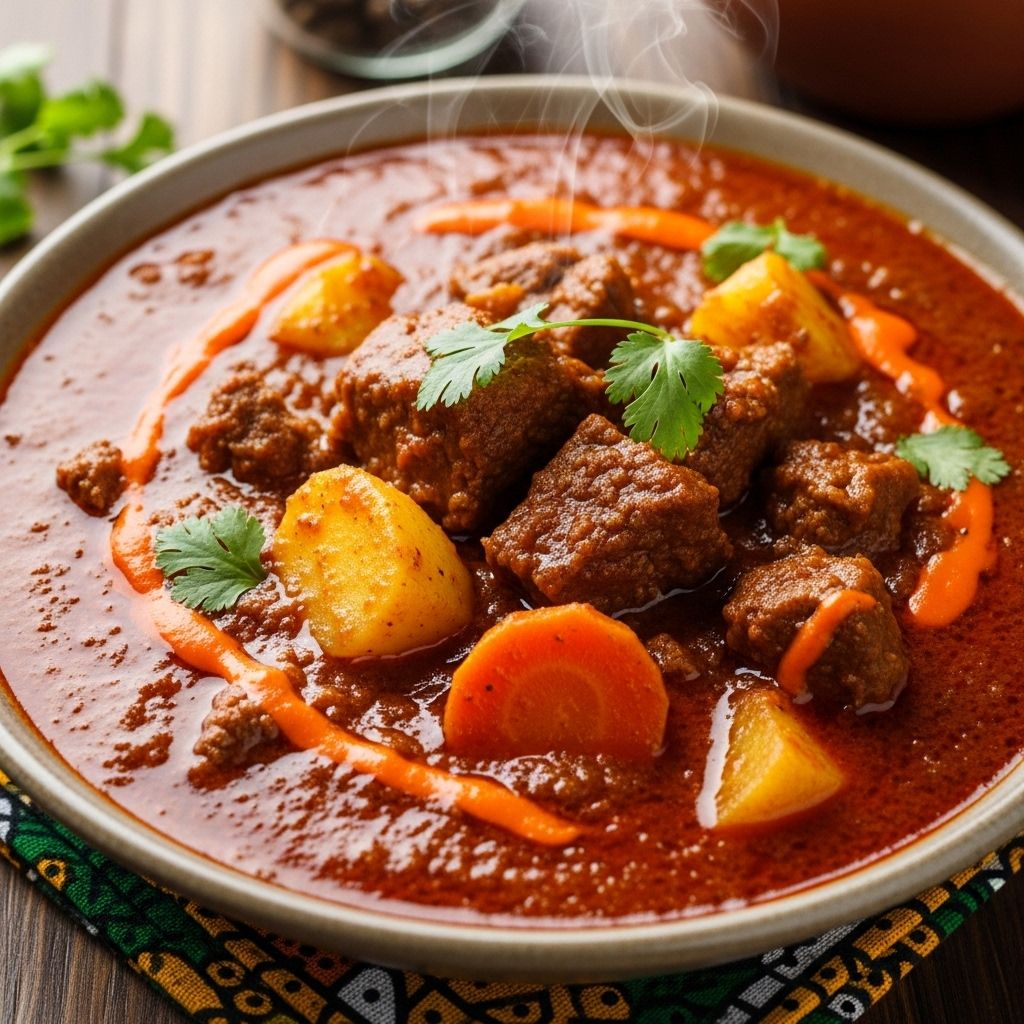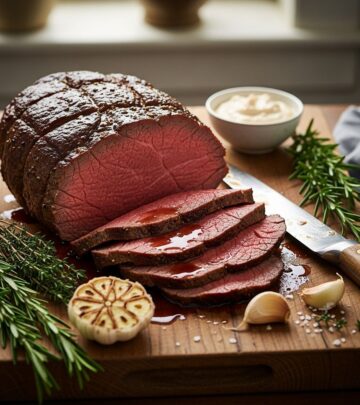Nigerian Beef Curry: Rich Tradition Meets Vibrant Flavor
Experience tender beef in a symphony of spices celebrating warmth and depth.

Nigerian Beef Curry: A Sensational Stew with Global Roots
Nigerian Beef Curry stands as an inviting emblem of the rich tapestry woven throughout Nigerian cuisine. This boldly flavored stew, simmered with savory spices and tender beef, music of fragrant aromatics—from ginger and garlic to curry powder—resonates not only through Nigerian homes but across global culinary landscapes. Let’s journey through its origins, ingredients, and steps to savor this comforting classic in your own kitchen.
The Cultural Origins of Nigerian Beef Curry
The story of Nigerian Beef Curry is one shaped by centuries of exchange and adaptation. The British colonial era introduced curry powder to West Africa, and Nigerian cooks embraced the versatile spice blend, infusing it with local ingenuity.
- Colonial Roots: Curry powder, a British invention inspired by Indian cuisine, found a new home in Nigeria. Local cooks tailored it to suit the palate with indigenous peppers and seasonings.
- Indigenous Flavors: Nigerian stews traditionally feature robust, spicy flavors: habanero, Scotch bonnet, ginger, and garlic, harmonized with the earthy aroma of curry powder.
Today, Nigerian Beef Curry is enjoyed across the country, often seen at festive gatherings, family dinners, and special occasions, proudly standing alongside other beloved classic stews.
Essential Ingredients for Nigerian Beef Curry
Each ingredient in Nigerian Beef Curry plays a vital role in creating its layered and vibrant taste profile. Here’s a breakdown of what goes into a typical pot:
| Ingredient | Purpose/Flavor |
|---|---|
| Beef (Chuck or Stewing Beef) | Tender protein; absorbs bold flavors |
| Onions | Sweetness and savor |
| Ginger & Garlic | Fragrant, zesty base |
| Fresh Hot Chiles (Habanero/Scotch Bonnet) | Heat and depth |
| Curry Powder | Distinctive aroma, warmth |
| Vegetable Oil | Sautéing ingredients |
| Potatoes & Carrots | Hearty texture; mild sweetness |
| Bay Leaves & Thyme | Earthy, herbal notes |
| Salt & Black Pepper | Seasoning |
| Water/Stock | Braising, creating rich sauce |
Step-by-Step: How to Make Nigerian Beef Curry
Let’s walk through the process, from prepping ingredients to serving the finished stew:
- Marinate the Beef: Rub chunks of beef with salt, pepper, and minced ginger/garlic. Allow to marinate while prepping vegetables.
- Sauté Aromatics: Heat oil in a large pot. Add onion, stirring until golden. Add ginger, garlic, and chopped hot chiles, frying until fragrant.
- Brown the Beef: Add marinated beef to the pot. Sear until browned on all sides for deeper flavor.
- Add Curry Powder and Spices: Sprinkle curry powder, thyme, and bay leaves over the beef; stir to coat and bloom the spices in the hot oil.
- Simmer and Braise: Pour in water or stock—just enough to submerge the beef. Bring to a gentle boil, reduce heat, cover, and simmer until beef becomes tender (about 35–50 minutes).
- Add Potatoes and Carrots: Stir chopped potatoes and carrots into the stew. Simmer uncovered until vegetables are soft and the sauce thickens (about 20–25 minutes).
- Final Adjustments: Season with salt, pepper, and additional curry powder if needed. Remove bay leaves before serving.
The result: A warm, hearty, and deeply aromatic stew ready to delight anyone at your table.
Tips for Authenticity and Flavor
- Choose the Right Beef: Use stewing cuts like chuck or shank—they become melt-in-your-mouth tender with slow cooking.
- Don’t Skimp on Spices: Fresh ginger, garlic, and a strong curry blend are the heart of the dish.
- Balance the Heat: Adjust chili amount for your spice tolerance. Scotch bonnet and habanero are traditional, but milder peppers can be substituted.
- Allow Time for Flavor: The longer the stew simmers, the richer the flavor becomes.
- Vegetable Variations: Replace potatoes and carrots with sweet potatoes, parsnips, or turnips for new flavors and textures.
How to Serve Nigerian Beef Curry
Beef curry is often accompanied by staple Nigerian sides, allowing the vibrant sauce to soak into grains and breads. Popular accompaniments include:
- White Rice: The classic foil for spicy stews, rice absorbs the rich sauce perfectly.
- Steamed Yams or Plantains: Mild and starchy, these base vegetables complement the bold flavors.
- Fried Dodo (Plantain Slices): Sweet and crispy plantains add delightful contrast.
- Fufu: A staple made from pounded yam, cassava, or plantain—perfect for scooping up the stew.
- Crusty Bread: Soaks up every drop of sauce, for a robust meal.
Garnish with fresh cilantro or parsley for added brightness.
Popular Variations and Adaptations
Over time, Nigerian Beef Curry has evolved, reflecting available ingredients and creative experimentation. Consider these spins:
- Chicken Curry: Substitute beef with chicken thighs or drumsticks for a lighter stew.
- Vegetarian Version: Replace beef with mushrooms, tofu, or eggplant—and use vegetable stock.
- Seafood Twist: Add shrimp or fish fillets toward the end of cooking.
- Extra Vegetables: Toss in bell peppers, peas, or spinach for a colorful, nutritious base.
While the base remains familiar, these variations invite fresh taste experiences and keep the dish adaptable for any table.
Nutrition and Dietary Considerations
Nigerian Beef Curry is not only flavorful but nourishing. Here’s a brief look at its nutritional profile:
- Protein: Beef provides high-quality protein essential for muscle and tissue health.
- Vitamins: Potatoes, carrots, and peppers add vitamin C, vitamin A, and potassium.
- Fiber: The root vegetables and optional whole grains (brown rice) increase overall fiber.
- Customizable for Diets: Select lean beef; reduce oil; use skinless chicken for lighter versions.
As with any stew, portion sizes and ingredients can be tailored to suit specific dietary needs, including low-fat, gluten-free, or dairy-free restrictions.
Nigerian Beef Curry: Beyond the Recipe
To many Nigerians, this curry isn’t just a meal—it’s a connection to home, family, and heritage. Regional differences abound, with each household adding their own twist. In celebrations and quiet dinners alike, the aroma of curry stew signals comfort, warmth, and togetherness.
Sharing this dish honors a legacy of adaptation and creativity, reflecting the melding of global and local flavors that shape contemporary Nigerian cuisine. From market stalls to urban kitchens, Nigerian Beef Curry remains a beloved staple.
Frequently Asked Questions (FAQs)
Q: Can I make Nigerian Beef Curry ahead of time?
A: Yes! The flavors deepen as it sits; refrigerate up to three days or freeze for several months. Reheat gently before serving.
Q: What curry powder is best for authenticity?
A: Use a robust, aromatic blend with turmeric, coriander, cumin, and fenugreek. Some Nigerian brands are available in African grocery stores.
Q: Can I use a slow cooker?
A: Absolutely. Brown the beef and aromatics first on the stovetop, then transfer to the slow cooker for a hands-off approach.
Q: Is Nigerian Beef Curry spicy?
A: Traditionally, yes—Scotch bonnet or habanero peppers add a bold kick. Adjust the amount for your spice preference.
Q: What side dishes pair well?
A: White rice, yams, plantains, fufu, or crusty bread are all excellent choices to accompany Nigerian beef curry.
Conclusion: A Bowl of Nigerian Heritage
Nigerian Beef Curry is more than the sum of its ingredients. It’s the story of culinary fusion, a celebration of community, and a heartwarming comfort food that delivers flavor in every bite. Whether you’re new to Nigerian cuisine or longing to recreate a favorite recipe from home, this stew is the perfect place to begin—and return to, time and time again.
As you simmer, stir, and savor, remember: each pot of Nigerian Beef Curry tells its own story, rich in tradition and bursting with life.
References
Read full bio of Sneha Tete












